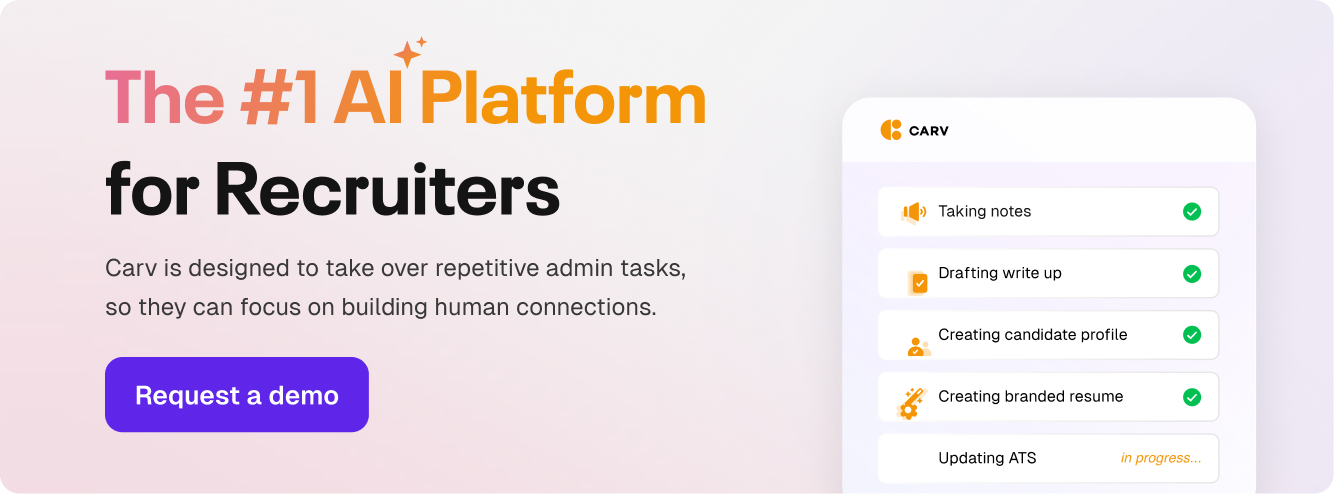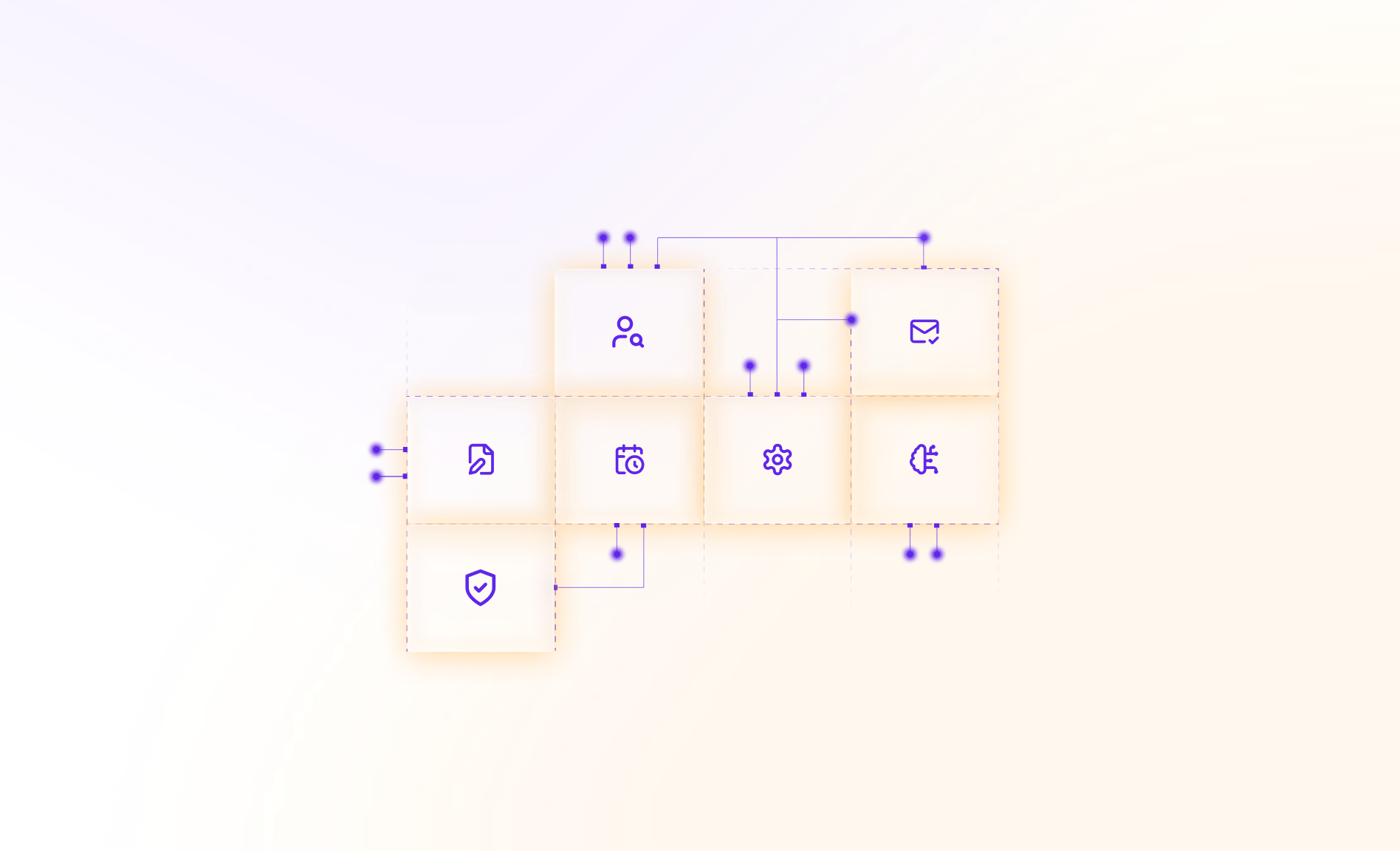The rapid adoption of AI in recruitment is sparking a lot of debate, creating friction between the different stakeholders.
On one side, there's excitement about AI's potential to streamline hiring processes and improve effectiveness. On the other, there are concerns about job displacement, the ethical use of AI, and the accuracy of algorithms.
Agency owners are eager to leverage AI to boost productivity and revenue. Recruiters are happy to use AI tools to do their work faster, but they worry about becoming obsolete or too reliant on technology and losing their personal touch.
Candidates appreciate the efficiency that artificial intelligence brings to the process, but fear that an AI recruiter might overlook their unique qualities or reduce their chance of being seen as more than just a set of keywords.
With AI’s growing capabilities in automating tasks, analyzing data, and interacting with candidates, many wonder: Will AI replace recruiters entirely?
AI is taking recruitment by storm
AI is already making significant strides in the recruitment process. Tools powered by AI are now capable of tackling complex problems previously thought unsolvable.
They handle time-consuming administrative tasks with human-like efficiency, thanks to their ability to understand context and interpret information similarly to humans.
For instance, AI assistants are joining recruitment calls, listening in, taking notes, and using this context to execute follow-up tasks. These tasks can range from writing candidate profiles to sourcing candidates and pre-screening them.
AI also manages data entry tasks, ensuring clean and accurate candidate information in ATS systems. This automation allows recruiters to concentrate on strategic activities and improve the quality of hires.
%20(1).avif)
Across the recruitment funnel, AI-powered tools are handling tasks previously considered uniquely human:
- Candidate communication: AI chatbots engage with job seekers in real-time, answer queries, provide updates, and even conduct initial interviews, keeping qualified candidates informed and engaged.
- Profile and resume screening: AI scans and analyzes resumes at scale, engages them in pre-screening calls, and shortlisting potential candidates based on job criteria.
- Interview scheduling and team coordination: AI coordinates between recruiters, candidates, and hiring managers to schedule interviews, reducing the back-and-forth by managing job openings, availability, and preferences.
- Writing recruitment documents: AI tools draft job descriptions, candidate write-ups, offer letters, and other recruitment-related documents. These tools generate content that aligns with the company’s tone and requirements, ensuring consistency across communications.
- Onboarding support: AI supports human resources teams during onboarding by providing new hires with the necessary information, answering questions, and ensuring that all paperwork and compliance requirements are met.
Besides automation, AI algorithms offers valuable insights by analyzing candidate data and identifying trends that might not be obvious to humans. This capability helps recruiters make better hiring decisions and enhance the overall quality of hires.
So if AI can handle all these tasks, sometimes more precisely and efficiently than human recruiters, why don’t we just delegate the entire hiring process to artificial intelligence?
Why AI might replace recruiters
The idea of AI completely replacing recruiters might seem far-fetched, but several compelling arguments suggest that it could be a plausible scenario in the future.
Here are some reasons why AI could potentially take over the recruitment function entirely.
1. Efficiency and speed: AI can process data and complete tasks like scanning resumes, posting on job boards, or taking notes during interviews much faster than humans, potentially leading to quicker hiring and reduced time-to-fill.
2. Consistency and objectivity: AI algorithms remove biases in decision-making by evaluating all candidates against the same criteria, ensuring fairer and more consistent hiring decisions.
3. Cost-effectiveness: AI can automate routine recruitment tasks, reducing costs associated with salaries and time, making it a potentially cheaper alternative to a large team of recruiters.
4. 24/7 availability: AI operates continuously, providing immediate responses and updates, which enhances the candidate experience and moves job seekers through the hiring process faster.
5. Advanced data analysis: Machine learning algorithms can learn from past hiring data and refine their predictions about candidate success and fit, leading to better hiring decisions and a higher quality of hires over time.
6. Handling high-volume recruitment: AI can manage large volumes of applications efficiently, handling thousands of resumes, assessments, and interactions that would overwhelm human recruiters.
7. Reduced human error: AI reduces errors from fatigue or bias, performing tasks with high accuracy and reliability, thereby enhancing the recruitment process.
While AI shows great potential, it's unlikely to completely replace recruiters anytime soon. Significant advancements in AI technology, especially in areas like emotional intelligence and complex decision-making, will be necessary for such a shift.
The human element in recruitment
While AI is a powerful tool in recruitment, it cannot yet fully replace human judgment and skills. There are several areas where the human touch remains crucial.
Human recruiters excel at reading between the lines, understanding subtle emotional cues, and assessing soft skills—tasks that require empathy and intuition that AI currently lacks.
Recruitment often involves weighing multiple subjective factors, such as cultural fit, personality, and potential for growth—nuanced decisions that AI may struggle with.
Building relationships is at the core of recruitment. While AI can facilitate initial interactions with job seekers and hiring managers, fostering trust and understanding individual motivations during the job search process requires a personal touch.
Negotiations about salary, benefits, and job expectations often need human finesse, as successful negotiations involve empathy and a deep understanding of both parties' perspectives.
Recruiters also act as ambassadors of a company's employer brand, shaping candidates' perceptions and attracting top talent in ways that AI cannot replicate. Additionally, unusual hiring scenarios demand creative problem-solving and adaptability based on context—skills where human judgment excels over AI recruiting systems.
Is AI the future of recruitment? The most likely scenario
Given the current advancements, the future of recruitment is likely to see AI and human recruiters working together rather than AI completely replacing recruiters.
Here’s how this might unfold.
- AI as productivity booster: AI will serve as a productivity booster by taking over time-consuming, repetitive tasks. This shift will free up recruiters to focus on high-value activities that require a human touch, such as strategic planning and building relationships.
- Data-driven decision support: With AI providing deeper insights and analytics, recruiters will benefit from enhanced data-driven decision support, enabling them to make more informed choices.
- Enhanced candidate experience: AI tools will also improve the candidate experience by creating a smoother, more responsive journey, while human recruiters will step in at crucial moments to add a personal touch.
- Reduced bias: AI's ability to identify and mitigate unconscious biases will help foster a fairer recruitment process, although human oversight will still be necessary to ensure complete fairness.
- Continuous learning: As AI systems become more sophisticated, they'll learn from human recruiters, continuously improving their capabilities.
As AI becomes more integrated into recruitment, recruiters will need to not only adapt but also embrace a new set of skills to fully leverage this tech-human partnership.
The recruiter of the future
In an AI-enhanced recruitment landscape, the role of the recruiter is evolving, and future recruiters will need to embrace a new set of skills to thrive.
Tech savviness will be key, as understanding and leveraging AI tools effectively becomes crucial. Recruiters will need to be comfortable with technology and adept at using these tools to streamline their processes.
Data interpretation will also be increasingly important. With AI generating valuable insights, recruiters must be able to analyze and act on this information to make informed decisions.
As AI takes over more routine tasks, strategic thinking will come to the forefront. Recruiters will shift their focus from tactical operations to broader, strategic aspects of talent acquisition, shaping long-term hiring strategies.
Emotional intelligence will remain a critical asset. While AI handles more technical aspects, human skills like empathy and interpersonal communication will be vital for managing relationships and understanding candidates on a deeper level.
Finally, adaptability will be essential. As the recruitment landscape continues to evolve, recruiters will need to stay flexible and open to change, continuously adjusting their approaches to align with new technologies and practices.
In summary, the recruiter of the future will blend tech-savviness with strategic insight, emotional intelligence, and adaptability to navigate and excel in an increasingly AI-driven world.
Conclusion
AI will undoubtedly transform the recruitment industry, but will it make recruiters obsolete?
The reality is that the future of recruitment will likely be shaped by how well the industry adapts to and integrates AI technologies, and how society at large comes to view the balance between technological efficiency and human interaction in the hiring process.
While some predict that artificial intelligence will completely replace human recruiters, our belief is that we're moving towards a future where AI and human recruiters work collaboratively, each leveraging their unique strengths.
This relationship will likely result in more efficient, effective, and fair recruitment processes.



%20(1).avif)



%20(1).avif)
.avif)